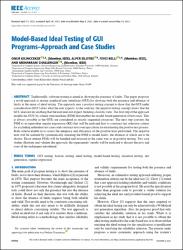Model-Based Ideal Testing of GUI Programs-Approach and Case Studies
Künye
O. Kilincceker, A. Silistre, F. Belli and M. Challenger, "Model-Based Ideal Testing of GUI Programs–Approach and Case Studies," in IEEE Access, vol. 9, pp. 68966-68984, 2021, doi: 10.1109/ACCESS.2021.3077518.Özet
Traditionally, software testing is aimed at showing the presence of faults. This paper proposes a novel approach to testing graphical user interfaces (GUI) for showing both the presence and absence of faults in the sense of ideal testing. The approach uses a positive testing concept to show that the GUI under consideration (GUC) does what the user expects; to the contrary, the negative testing concept shows that the GUC does not do anything that the user does not expect, building a holistic view. The first step of the approach models the GUC by a finite state machine (FSM) that enables the model-based generation of test cases. This is always possible as the GUIs are considered as strictly sequential processes. The next step converts the FSM to an equivalent regular expression (RE) that will be analyzed first to construct test selection criteria for excluding redundant test cases and construct test coverage criteria for terminating the positive test process. Both criteria enable us to assess the adequacy and efficiency of the positive tests performed. The negative tests will be realized by systematically mutating the FSM to model faults, the absence of which are to be shown. Those mutant FSMs will be handled and assessed in the same way as in positive testing. Two case studies illustrate and validate the approach; the experiments' results will be analyzed to discuss the pros and cons of the techniques introduced.


















